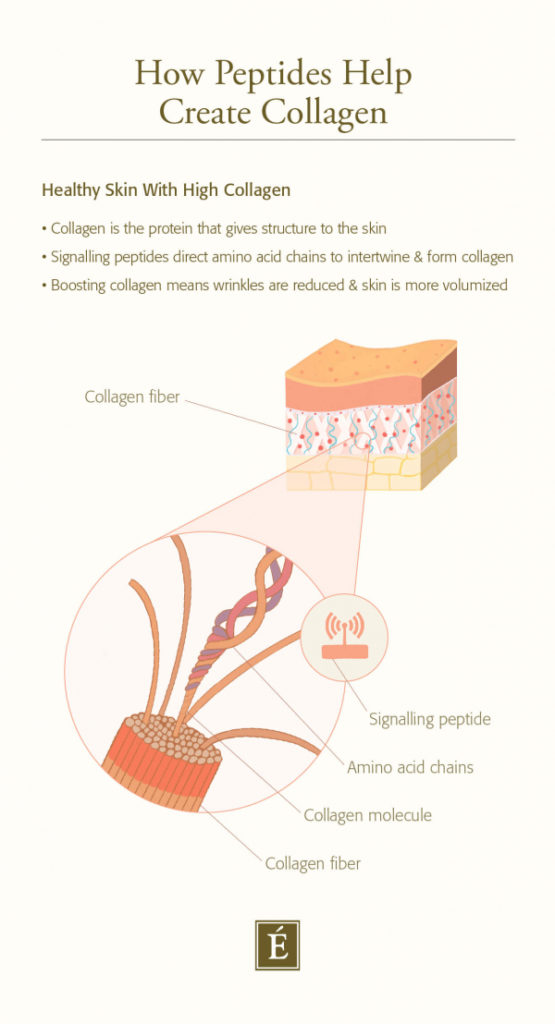Peptides For The Skin: How Do They Fight The Look Of Wrinkles?
Here's a pop quiz: what are peptides and how are they related to wrinkles? Sometimes skin care buzz ingredients sound like mysterious by-products from a high school science experiment. Before you get out your biology textbook, we have a simple guide to these naturally occurring ingredients. Here's your handy cheat sheet on peptides for skin, why they work, and how they reduce the appearance of wrinkles.
Why do I get wrinkles?
Have you ever wondered what happens to your skin when you see wrinkles? The skin is made up of three layers consisting of the epidermis, dermis and hypodermis. In the dermis you will find collagen, the most important structural protein in the skin. As we get older, we lose collagen, the protein that gives our skin its hold and elasticity. Collagen is the “stone and mortar” of our skin, but as we age we slowly produce less and less of it, making the skin thinner and more sensitive. In addition to the natural aging process, collagen loss can be caused by lifestyle factors such as smoking, sun damage, or poor diet.
So where do peptides fit in? When collagen breaks down, it forms peptides that signal the skin to produce new collagen. By applying additional signal peptides through skin care products, we are actually tricking the skin into making more collagen. As a crucial step in the collagen production process, peptides promote a firmer and smoother appearance of the skin.

What are peptides?
As ThoughtCo explains, “A peptide is a molecule made up of two or more amino acids linked by peptide bonds.” Since proteins are also made up of amino acids, you may be wondering: what is the difference between peptides and proteins? ? Peptides contain between two and 50 amino acids, while proteins contain more than 50. Proteins are essentially large peptides (called polypeptides) that are made up of multiple peptide units; they are much longer and structurally more complex than their smaller counterparts. So while all proteins contain peptides, no peptides contain proteins. Since collagen, elastin, and keratin are all important proteins for healthy skin, the peptides involved in their formation are also critical to maintaining the health of your skin.
What are the benefits of peptides in skin care?
There are many types of peptides (think hundreds), but when it comes to skin care products there are a few key players that you can reach for. Eminence Organics Lead Skin Care Trainer Natalie Pergar says there are two specifically that she believes are the most effective – signal peptides and neuropeptides. As we have already learned, signal peptides trigger the body's natural processes to rebuild the longer-chain proteins to create collagen for skin care. Neuropeptides, on the other hand, work at the muscular level to block the transmission of signals from the nerves to the facial muscles.
As Natalie describes: “An important difference between peptides and other beauty ingredients is that peptides work in harmony with the body's natural processes. Other ingredients can benefit the skin but cannot trigger a reaction in the body – for example, vitamin C provides antioxidants, but the body is unable to produce vitamin C on its own. ”
If you want to experience the benefits of peptides, our Marine Flower Peptide Collection uses both plant-based peptides and marine flower technology. The peptides in this collection are obtained naturally from sacha inchi and rice protein and are intended to make the appearance of our skin firmer and more elastic.
With this crash course in peptides, you are sure to be equipped to expand your skin care routine. Do you already use peptides in your skin care products? Are there any other skin-smoothing ingredients that you prefer? Let us know in the comments below or on social media.
This article was originally written by Karen Young Chester in 2015.








































 It is time for someone else to lead breaking muscle through the next decade.
It is time for someone else to lead breaking muscle through the next decade.
 How To Determine If You Are A Suitable Recomposition Candidate And Your Best Strategies For Success.
How To Determine If You Are A Suitable Recomposition Candidate And Your Best Strategies For Success.
 When I majored in kinesiology at school, the inability to diagnose and treat was the spark that drove me to physical therapy.
When I majored in kinesiology at school, the inability to diagnose and treat was the spark that drove me to physical therapy.